初三英语上册(人教新目标)Unit6Whenwasitinvented知识点总结
人教版九年级英语Unit6知识点总结
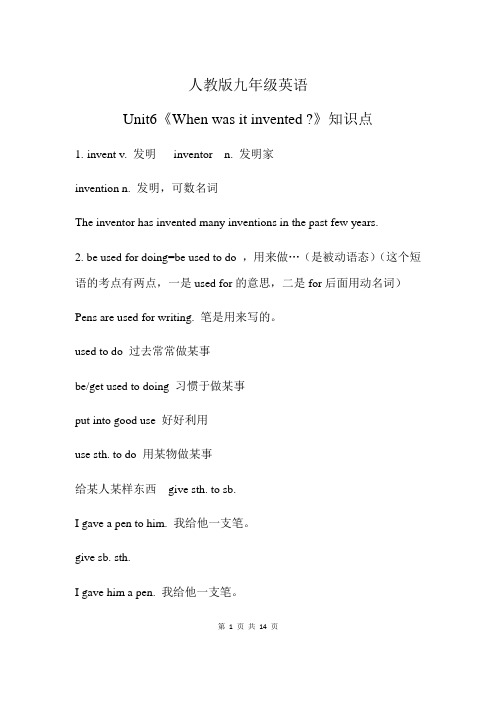
人教版九年级英语Unit6《When was it invented ?》知识点1.invent v. 发明inventor n. 发明家invention n. 发明,可数名词The inventor has invented many inventions in the past few years.2. be used for doing=be used to do ,用来做…(是被动语态)(这个短语的考点有两点,一是used for的意思,二是for后面用动名词)Pens are used for writing. 笔是用来写的。
used to do 过去常常做某事be/get used to doing 习惯于做某事put into good use 好好利用use sth. to do 用某物做某事给某人某样东西give sth. to sb.I gave a pen to him. 我给他一支笔。
give sb. sth.I gave him a pen. 我给他一支笔。
第 1 页共14 页pass/offer /send/show/write/bring/sell/lend/serve/ tobuy/cook/make/get/sing/prepare for4. all day 整天all evening/night the whole day5. salty adj. 咸的salt n. 盐sour/sweet/bitter/hot/salty酸甜苦辣咸6. by mistake 错误地(犯错是:make mistakes=make a mistake,这些常见的短语大家务必要掌握)I took the umbrella by mistake. 我不小心拿错了雨伞。
7. by accident/chance 意外,偶然(常见短语,考的最多的是它的意思)I met her by accident at bus stop.我在公共汽车站意外地见到了她。
Unit6Whenwasitinvented?知识梳理人教版英语九年级全册
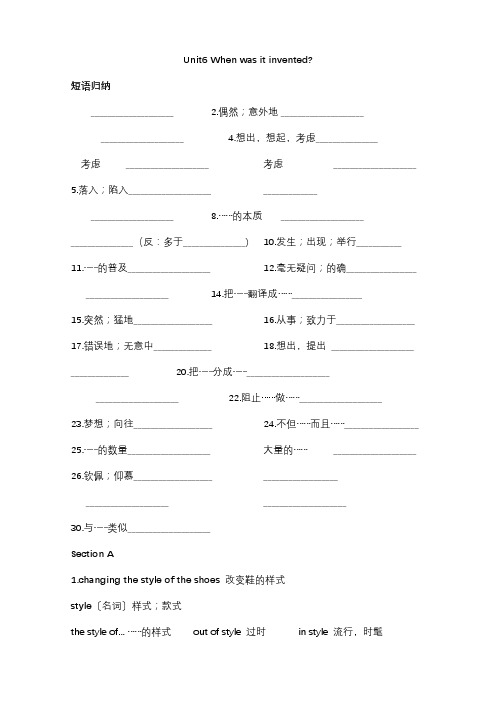
Unit6 When was it invented?短语归纳____________________ 2.偶然;意外地 ________________________________________ 4.想出,想起,考虑_______________考虑____________________ 考虑____________________ 5.落入;陷入____________________ _________________________________ 8.……的本质___________________________________(反:多于_______________) 10.发生;出现;举行___________ 11.……的普及____________________ 12.毫无疑问;的确_____________________________________ 14.把……翻译成……_________________15.突然;猛地___________________ 16.从事;致力于___________________ 17.错误地;无意中______________ 18.想出,提出____________________ ______________ 20.把……分成……________________________________________ 22.阻止……做……____________________23.梦想;向往___________________ 24.不但……而且……__________________25.……的数量____________________ 大量的……____________________26.钦佩;仰慕___________________ ______________________________________ ____________________30.与……类似____________________Section A1.changing the style of the shoes改变鞋的样式style〔名词〕样式;款式the style of... ……的样式out of style 过时in style 流行,时髦The style of the blouse is my mother's favorite.2.—Can you help me think of an invention?你能帮我想个发明吗?—With pleasure!乐意效劳!1) Can you do...?你能做……吗?此句型表示客气地请求某人做某事,其肯定回答一般为“Sure, I'd love/like to./With pleasure.”。
人教版九年级全一册英语Unit6重点语法知识点总结

人教版九年级全一册英语Unit6重点语法知识点总结Unit 6 When was it invented?Section A(1a~2d)_必记单词ⅢⅢ1. heel n.鞋跟;足跟【例句】His heel is raw because his shoe does not fit well. 因鞋子不合适,他的脚后跟擦破皮了。
2. scoop n. 勺;铲子【例句】He used a scoop to scrve the ice cream. 他用铲子来吃冰激凌。
3. electricity n.电;电能【例句】While I was cooking supper, the electricity went off.我正在做晚饭时停电了。
【联想】electrical adj.电的,与电有关的4. style n.样式;款式【例句】The style of this skirt is just in season.这条裙子的款式正当时令。
【搭配】out of style 过时的|| in style 流行;时髦地5. project n.项目;工程【例句】The project is proceeding as planned. 工程正在按计划进行。
【联想】projection n.设计;规划;放映6. pleasure n.高兴;愉快【例句】He didn't show any pleasure when I offered to go withhim.我提出和他一起去,他并没有表示出高兴的样子。
【搭配】pleasure in... 以……为荣‖with pleasure 乐意效劳It's a /my pleasure.不客气。
【注意】pleasure 多用作不可数名词,当做“快乐的事,乐事”解时用作可数名词。
7. zipper n.(=zip) 拉链;拉【例句】The zipper is red.这条拉链是红色的。
Unit6Whenwasitinvented_重点短语句子及其运用2023-2024学年人教版英语九
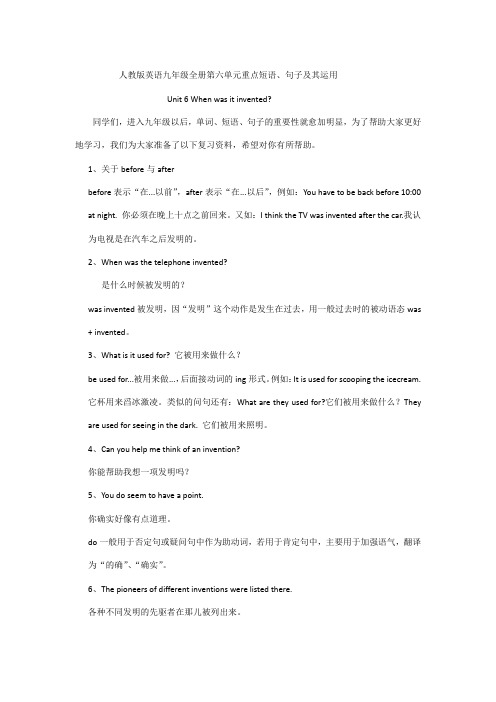
人教版英语九年级全册第六单元重点短语、句子及其运用Unit 6 When was it invented?同学们,进入九年级以后,单词、短语、句子的重要性就愈加明显,为了帮助大家更好地学习,我们为大家准备了以下复习资料,希望对你有所帮助。
1、关于before与afterbefore表示“在...以前”,after表示“在...以后”,例如:You have to be back before 10:00 at night. 你必须在晚上十点之前回来。
又如:I think the TV was invented after the car.我认为电视是在汽车之后发明的。
2、When was the telephone invented?是什么时候被发明的?was invented被发明,因“发明”这个动作是发生在过去,用一般过去时的被动语态was + invented。
3、What is it used for? 它被用来做什么?be used for...被用来做...,后面接动词的ing形式。
例如:It is used for scooping the icecream.它杯用来舀冰激凌。
类似的问句还有:What are they used for?它们被用来做什么?They are used for seeing in the dark. 它们被用来照明。
4、Can you help me think of an invention?你能帮助我想一项发明吗?5、You do seem to have a point.你确实好像有点道理。
do一般用于否定句或疑问句中作为助动词,若用于肯定句中,主要用于加强语气,翻译为“的确”、“确实”。
6、The pioneers of different inventions were listed there.各种不同发明的先驱者在那儿被列出来。
were listed被列出来,一般过去时的被动语态。
九年级英语全册 Unit 6 When was it invented?知识点总结 (新版)人教新目标版
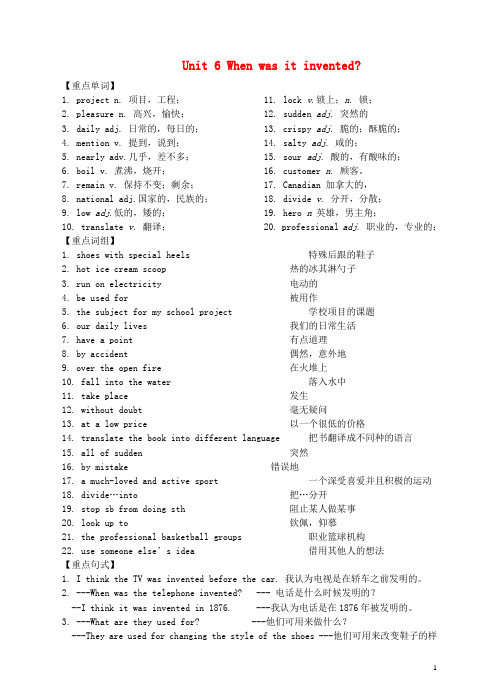
Unit 6 When was it invented? 【重点单词】1. project n. 项目,工程;2. pleasure n. 高兴,愉快;3. daily adj. 日常的,每日的;4. mention v. 提到,说到;5. nearly adv.几乎,差不多;6. boil v. 煮沸,烧开;7. remain v. 保持不变;剩余;8. national adj.国家的,民族的;9. low adj.低的,矮的;10. translate v.翻译;11. lock v.锁上;n. 锁;12. sudden adj. 突然的13. crispy adj. 脆的;酥脆的;14. salty adj.咸的;15. sour adj.酸的,有酸味的;16. customer n.顾客。
17. Canadian 加拿大的,18. divide v.分开,分散;19. hero n英雄,男主角;20. professional adj. 职业的,专业的;【重点词组】1. shoes with special heels 特殊后跟的鞋子2. hot ice cream scoop 热的冰其淋勺子3. run on electricity 电动的4. be used for 被用作5. the subject for my school project 学校项目的课题6. our daily lives 我们的日常生活7. have a point 有点道理8. by accident 偶然,意外地9. over the open fire 在火堆上10. fall into the water 落入水中11. take place 发生12. without doubt 毫无疑问13. at a low price 以一个很低的价格14. translate the book into different language 把书翻译成不同种的语言15. all of sudden 突然16. by mistake 错误地17. a much-loved and active sport 一个深受喜爱并且积极的运动18. divide…into 把…分开19. stop sb from doing sth 阻止某人做某事20. look up to 钦佩,仰慕21. the professional basketball groups 职业篮球机构22. use someone else’s idea 借用其他人的想法【重点句式】1. I think the TV was invented before the car. 我认为电视是在轿车之前发明的。
九年级英语全册 Unit 6 When was it invented重点总结(短语+句型+作文)素材 (新版)人教新目标版
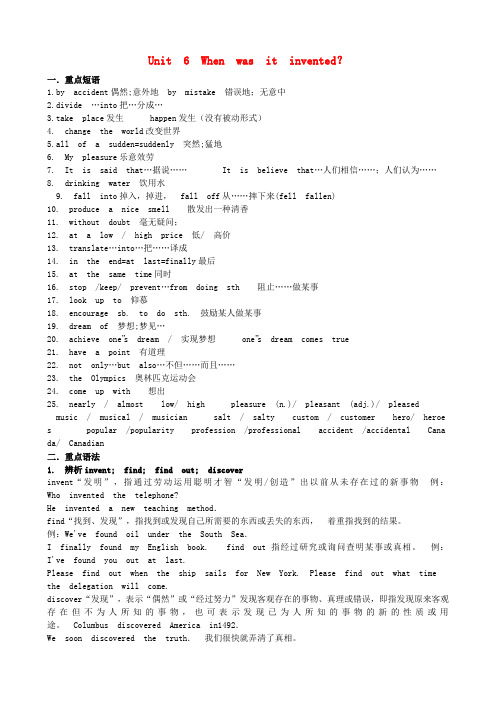
Unit 6 When was it invented?一.重点短语1.by accident偶然;意外地by mistake 错误地;无意中2.divide …into把…分成…3.take place发生happen发生(没有被动形式)4. change the world改变世界5.all of a sudden=suddenly 突然;猛地6. My pleasure乐意效劳7. It is said that…据说……It is believe that…人们相信……;人们认为……8. drinking water 饮用水9. fall into掉入,掉进,fall off从……摔下来(fell fallen)10. produce a nice smell 散发出一种清香11. without doubt 毫无疑问;12. at a low / high price 低/ 高价13. translate…into…把……译成14. in the end=at last=finally最后15. at the same time同时16. stop /keep/ prevent…from doing sth 阻止……做某事17. look up to 仰慕18. encourage sb. to do sth. 鼓励某人做某事19. dream of 梦想;梦见…20. achieve one‟s dream / 实现梦想one‟s dream comes true21. have a point 有道理22. not only…but also…不但……而且……23. the Olympics 奥林匹克运动会24. come up with 想出25. nearly / almost low/ high pleasure (n.)/ pleasant (adj.)/ pleasedmusic / musical / musician salt / salty custom / customer hero/ heroe s popular /popularity profession /professional accident /accidental Cana da/ Canadian二.重点语法1. 辨析invent; find; find out; discoverinvent“发明”,指通过劳动运用聪明才智“发明/创造”出以前从未存在过的新事物例:Who invented the telephone?He invented a new teaching method.find“找到、发现”,指找到或发现自己所需要的东西或丢失的东西,着重指找到的结果。
人教版英语9年级上册第6单元sectionB知识点总结
篮球是由出生于1861年的加拿大医生詹姆斯·奈史密斯发明的。。
Canadian
adj. 加拿大的;加拿大人的 n. 加拿大人 Cana1861. 非限制性定语从句。 先行词是人关系词用who
popular
adj. 受欢迎的
7. The number of foreign players, including Chinese players, in the NBA has increased. p46
包括中国球员在内的NBA外籍球员数量有所增加.
including 介词. 包含;包括
include v. including 介 included adj.
A.into B. in C. on D. onto
1. We are going to divide the class__D__small groups.
A.to B. in C. of D .into
2. He lived in place ____D______ Gum Tree.
A.called B. name C. named D. Both A and C
这些明星鼓励年轻人努力工作来实现他们的梦想。
encourage sb. to do sth. 鼓励某人做某事
achieve v. 完成;实现
achieve one's dream 实现梦想
Exercises 1. -__D___boys come to swim. Do you know_____ of them?
这台冰箱以低价出售。
look up to 钦佩;仰慕;抬头看
初中英语人教版九年上Unit6 When was it invented重点词汇辨析与运用
Unit 6 When was it invented 重点词汇辨析与运用2024-2025学年上学期初中英语人教版九年级一、重点词汇翻译1.n.鞋跟;足跟2.n.勺;铲子3.n.电;电能4.n.样式;款式5.n.项目;工程6.n.拉链;拉锁7.n.网站8.n.先锋;先驱9.v.列表;列清单n.名单;清单10.v.提到;说到11.n.白天;一天→adj.每日的;日常的12.v.使高兴→n.高兴→adj.高兴的;乐意的13.v.煮沸;烧开14.v.保持不变;剩余15.n.疑惑;疑问v.怀疑16.n.贸易;交易v.做买卖;从事贸易17.adj.流行的→n.受欢迎;普及18.n.事故→ adj.意外的;偶然的19.n.国家;民族→adj.国家的;民族的20.v.统治;支配n.规则→n.尺子;统治者;支配者21.n.气味v.发出……气味;闻到→(过去式) →(过去分词) 22.n. 冰箱23.adj. 低的;矮的24.v. 锁上;锁住n. 锁25.n. 地震26.n. 钟(声);铃(声)27.n. 饼干28.n. 曲奇饼29.n. 器械;仪器;工具30.pron. 某人n. 重要人物31.v. 翻译→n. 翻译32.adj. 突然(的) →adv. 突然33.n. 音乐→adj. 音乐的;有音乐天赋的→n.音乐家34.v. (使) 发出钟声或铃声;打电话→(过去式) →(过去分词) 35.adj.脆的;酥脆的36.n.盐→adj.咸的37.adj.酸的;有酸味的38.n.顾客;客户39.v.分开;分散40.n.篮;筐41.adv.几乎42.n.英雄;男主角→(复数)43.n.职业→a dj.职业的;专业的44.n.加拿大→adj.加拿大的;加拿大人的n.加拿大人二、词汇辨析与用法45.style名词,意为“样式;款式;方式;风格”,短语表示“时髦的;流行的”;短语表示“过时的”。
46.pleasure名词,意为“高兴;愉快”,其相关词为:“v. 使满意;使愉快”;“adj.满意的;高兴的”;“adj.令人愉快的”。
人教版英语九年级Unit6 When was it invented?全单元知识点讲解
The teacher came in with a smile on
his face.
面带微笑
• project n.项目;工程
• pleasure n.高兴;愉快 eg:Reading gives me much pleasure.
常用短语:My pleasure./It's a /my pleasure./With pleasure.(很乐意/荣幸)
注意:Don't mention it. 用于口语,主要来 回答感谢,有时也用来回答道歉。
➢---Thank you very much. ---Don't mention it.不客气/不要这样说
➢---I'm sorry to trouble you. ---Don't mention it.没关系
daily English=daily English日常英语 adv.每天;每日=every day 作状语
eg:He comes here daily/every day. 拓展:daily n.日报
People's Daily《人民日报》 China Daily 类似的词:weekly adj.每周的 adv.一周一次
2.Well,you do seem to have a point... “do (does, did) + 动词原形”表示强调。 意为“确实;务必;一定;的确”。
eg:He d__o_e_s_come from America. 他的确来自美国。
I _d_i_d__call you yeaterday. 昨天我确实给你打电话了。
• pioneer n.先锋;先驱 China Young Pioneers中国少年先锋队
九年级英语全册Unit6Whenwasitinvented知识点归纳总结(精华版)(带答案)
九年级英语全册Unit6Whenwasitinvented知识点归纳总结(精华版)单选题1、The fish you bought yesterday smells ________. You’d better throw it away. A.goodB.badC.wellD.badly答案:B句意:你昨天买的鱼闻起来坏了,你最好把它扔掉。
good意为“好”,是形容词, bad 意为“坏的”,是形容词,well意为“好”,是副词,badly意为“坏地”,是副词。
smells意为“闻起来”,是系动词,后接形容词作表语。
根据You’d better throw it away.可知,故选B项。
2、Another bridge over the Jialing River________last year.A.buildsB.builtC.is builtD.was built答案:D句意:去年在嘉陵江上又建了一座桥。
考查动词的时态和被动语态。
builds动词第三人称单数形式,修建;built是build的过去式或过去分词形式;is built是一般现在时的被动语态;was built是一般过去时的被动语态。
根据句意可知,该句的主语Another bridge与动词构成被动关系,应用被动语态,排除A和B;再由句中的时间last year可知,应用一般过去时。
故选D。
3、Last year Huai'an Flyover(高架) _________. Now it brings much convenience to people. A.finishedB.finishesC.is finishingD.was finished答案:D句意:去年淮安高架建成。
现在它给人们带来了很多便利。
考查动词的时态。
finished完成,动词的过去式;finishes动词的一般现在时的第三人称单数;is finishing动词的现在进行时;was finished动词的一般过去时态的被动。
- 1、下载文档前请自行甄别文档内容的完整性,平台不提供额外的编辑、内容补充、找答案等附加服务。
- 2、"仅部分预览"的文档,不可在线预览部分如存在完整性等问题,可反馈申请退款(可完整预览的文档不适用该条件!)。
- 3、如文档侵犯您的权益,请联系客服反馈,我们会尽快为您处理(人工客服工作时间:9:00-18:30)。
初三英语上册(人教新目标)Unit 6 When was it invented?知识点总结一、重点辞汇·原文再现They are used for changing the style of the shoes.它们被用于改变鞋的样式。
·大体用法style n. 样式;样式Our children's different needs and learning styles created many problems.孩子们不同的需求和学习方式给咱们带来了许多问题。
·知识拓展---相关短语learning style 学习方式,学习风格life style 生活方式hair style 发型out of style 过时的Her dress is out of style.她的穿着不时兴。
·原文再现The subject for my school project is "Small inventions that changed the world."学校课题的题目是:改变世界的小发明“·大体用法project n. 项目;工程Project Hope 希望工程The project will create up to 40 new jobs.这项工程将提供40个新的工作职位。
·知识拓展---其他词性project v. 计划(plan)The next edition of the book is projected for publication in March.本书的下一版计划于三月发行。
·原文再现--Can you help me think of an invention?你能帮忙我想一个发明吗?--My pleasure!我很荣幸。
·大体用法pleasure n. 高兴;愉快Watching sport gave him great pleasure.观看体育比赛给他以极大的愉悦。
·知识拓展---相关短语1. at your/sb's pleasure 按照你的(或某人的)意愿;随意。
如:The land can be sold at the owner's pleasure.土地可按照主人的意愿售卖。
2. my pleasure!(对他人表示感激的一种礼貌回答)不客气,很乐意效劳。
3. with pleasure! (客气地接受或同意)固然了,很愿意。
如:---May I sit here?我能坐这儿吗?---Yes, with pleasure.固然,很乐意。
·原文再现Think about how often it's used in our daily lives.想一下在咱们的日常生活中常常利用的东西。
·大体用法daily adj. 每日的;日常的Be sure you get your daily quota of calcium.要确保天天的钙摄入量。
·知识拓展相关短语your daily bread 生计;(尤指)每日的食物其他词性daily adv. 每日;天天。
如:The machines are inspected twice daily.机械每日检查两次。
·原文再现The pioneers of different inventions were listed there.不同发明的前驱者被列在了那。
·大体用法1. v. 列表;列清单(过去式:listed 过去分词:listed 此刻分词:listing 单三:lists)The Koala is listed among Australia's endangered animals.树袋熊已列为澳大利亚濒临绝种的动物之一。
2. n. 名单;清单,经常常利用于make a list (of) 结构中,意为:列清单There were six names on the list.名单上有六个名字。
Make a list of your questions beforehand.事前列出你的问题。
·原文再现For example, it mentioned that the zipper was invented by Whitcomb Judson in 1893.例如,网站上说到拉链是在1893年由贾德森发明的。
·大体用法mention v. 提到;说到(过去式:mentioned 过去分词:mentioned 此刻分词:mentioning单三mentions)其用法主要有:1. mention sth/sb (to sb.) 向某人提起某人或某事。
如:Nobody mentioned anything to me about it.没有人跟我提过这事儿。
2. don't mention it.(他人道谢时回答)不客气。
如:Thanks for all your help. Don't mention it.多谢你帮忙。
不用客气。
3. not to mention.更不用说;且不说。
如:He has two big houses in this country, not to mention his villa in France.他在这个国家有两座大屋子,更别提他在法国的别墅了。
·原文再现Many people believe that tea was first drunk nearly 5,000 years ago.很多人以为茶第一次被饮用快要是在5千年前。
·大体用法nearly adv. 几乎;差不多;快要I was nearly asleep.我差不多都睡着了。
Nearly a third of the children were severely underweight.近1/3的孩子体重严重偏轻。
·知识拓展---相关短语not nearly 远非;绝不是It's not nearly as hot as last year.天断气没有去年那么热。
There isn't nearly enough time to get there now.此刻根本没有足够的时间赶到那儿。
·原文再现It produced a nice smell so he tasted the brown water anyway.它发出一种好闻的气味,所以他就尝了下那褐色的水·大体用法1. n. 气味What is your favorite smell?你喜欢哪一种气味呢?2. v. 发出...气味;闻到(过去式:smelled/smelt 过去分词:smelled/smelt 此刻分词:smelling 第三人称单数:smells)The tiger smelled the meat and went away.老虎闻了闻那块肉,然后走开了。
·知识拓展---相关单词smelly adj. 有难闻气味的。
有臭味的。
I don't like 're noisy, smelly, and what's more, expensive.我不喜欢酒吧。
那里又吵,气味又难闻,更重要的是,花费太多。
·原文再现Even though many people now know about tea culture, the Chinese are without doubt the oneswho best understand the nature of tea.即便此刻很多人都了解茶文化,可是毫无疑问最理解茶本质的仍是中国人。
·大体用法1. n. 疑问,疑惑I had my doubts when she started, but she's getting really good.她刚开始做时我心存疑虑,但她真的做得很好。
2. v. 怀疑(过去式doubted 过去分词doubted 此刻分词doubting 单三doubts)----"Somebody would have seen her."“可能有人见过她。
“----"I doubt it, not on Monday."”我以为不可能,不可能在礼拜一。
”·知识拓展---相关句型/结构there is no doubt that....毫无疑问...There is no doubt that he is the best player in the team.毫无疑问,他在队伍里是最优秀的选手。
·原文再现Different writers translated the book into different languages.不同的作家把书翻译成不同的语言。
·大体用法v. 翻译(过去式translated过去分词translated此刻分词translating单三translates)经常常利用于”translate...into.... “,意为:把...翻译成...He translated the letter into English.他把这封信翻译成了英文。
·知识拓展---相关名词translation n.翻译The book loses something in translation.此书在翻译进程中丢失了一些原意。
·原文再现The earthquake broke all of a sudden, but luckily the villagers were brought to a safe place.地震突然暴发,但幸运的是村民们被转移到了安全地带。
·大体用法adj. 突然的,经常常利用于”all of a sudden“结构中,表示”突然地“All of a sudden someone grabbed me around the neck.猛不防有人抓住了我的脖子。
·知识拓展---相关单词suddenly adv. 突然地I suddenly realized what I had to do.我突然明白我该怎么做了。
·原文再现The customer said they were not salty enough.顾客说它们不够咸。
